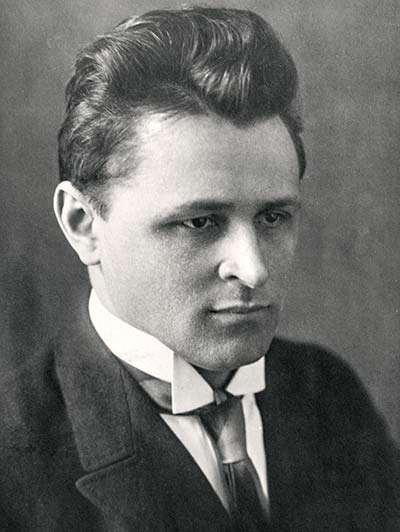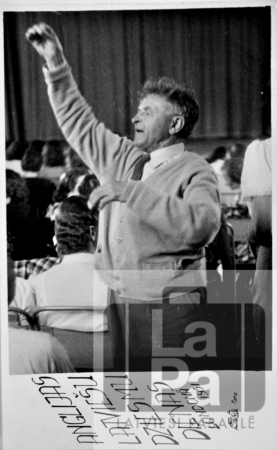Teodors Reiters
1884–1956
Conductor, organist
One of the most outstanding Latvian conductors of choirs, orchestras and opera of the first half of the 20th century.
Born on 23 March 1884 at the Muižnieki homestead in Ļaudona. Attended the Ļaudona congregation school, then the Pskov Teachers’ Seminary (1902-1905). From 1907 to 1917, studied at the St Petersburg Conservatory, where he graduated from the composition class of Jāzeps Vītols and the conducting class of Nikolai Tcherepnin.
During his studies, he sang and practiced conducting with the mixed choir of the St Petersburg Latvian Singing Society and performed at all the major Latvian music concerts in St. Petersburg and Moscow. He worked as the Kapellmeister and conductor of the St Petersburg Latvian Riflemen’s symphony orchestra, whose musicians later formed the core of the Latvian Opera Company orchestra, with which he returned to Rīga in 1918. After returning to Latvia, he became the conductor of the Latvju Latvian opera, later the Latvian Opera (1918-1944) and its director for two periods (1922-1926, 1931-1934). In parallel, he founded the legendary Reiters Choir, which performed in Rīga (1920-1944) and later in Stockholm (1945-1956). Developed a wide range of concert activity and gained international fame with the choir.
Took his first steps as a chief conductor in 1922 at the First Latvian Youth Song Festival. From then until 1943, was invited every summer to lead the musical activities at different song festivals and days of song.
A chief conductor at the VIth-IXth All-Latvian Song and Dance Festivals, as well as a member of the organising committee for the VIth and VIIth Song Festivals. Had a particular interest in festival repertoire. Together with Pauls Pēteris Jozuus, were the only Latvian delegates to the VIth Song Festival competition jury for new compositions. Reiters willingly took on premiere performances of the winning works at this and all subsequent song festivals. Stood up for compositions most appropriate to the era and artistically complete to be included festival concert programmes, thus opening the way for the debuts of Ādolfs Ābele, Volfgangs Dārziņš, Jēkabs Graubiņš, Jānis Norvilis, Helmers Pavasars, Marģers Zariņš and many other composers. The Song-festival performances of Reiters have always been brilliant. His precise interpretation of the music’s intentions, the expressiveness of his hands, conductor’s stance and personal charisma are emphasised. Valentīna Gružane, a member of the Reiters Choir, remembers: “It was as if his hands made us take flight. When Teodors Reiters was conducting, indescribable strange fluids seemed to flow from his gestures and gaze, which inspired, enthralled, carried away the choristers, whether in a concert hall or on the great Festival stage ... We stood tall for him and, if needed, we were always ready to fall for him.” (Grauzdiņa, Ilma, Izredzētie (The Chosen Few), 2008, p 77)
During the Second World War, escaped as a refugee to Sweden in 1944, where he worked as a conductor and music notator. In the mid-1950s, he founded the Latvian Music publishing house.
Officer, (1926) and Commander (1934), Order of the Three Stars, Exiled People’s Laureate (1954), and awarded Sweden’s Order of Vasa (1934).

![8.latviešu dziesmu svētki. 60.g. dziesmu svētki [attēls]. Pirmā rindā no kreisās: Teodors Kalniņš, Jāzeps Vītols, Alfrēds Kalniņš, Emilis Melngailis, Teodors Reiters](https://dziesmusvetki.lndb.lv/wp-content/uploads/objects/41650/resized/2resized_thumbnail.png)
































